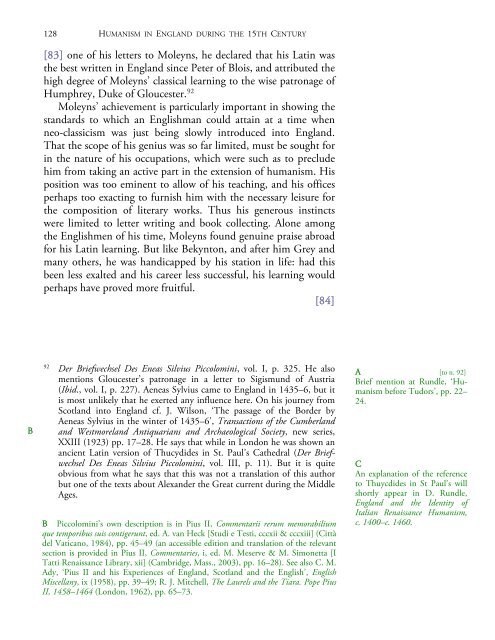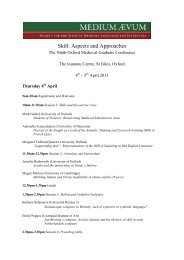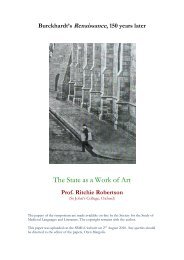integrated - Medium Aevum - University of Oxford
integrated - Medium Aevum - University of Oxford
integrated - Medium Aevum - University of Oxford
Create successful ePaper yourself
Turn your PDF publications into a flip-book with our unique Google optimized e-Paper software.
128 HUMANISM IN ENGLAND DURING THE 15TH CENTURY<br />
[83] one <strong>of</strong> his letters to Moleyns, he declared that his Latin was<br />
the best written in England since Peter <strong>of</strong> Blois, and attributed the<br />
high degree <strong>of</strong> Moleyns’ classical learning to the wise patronage <strong>of</strong><br />
Humphrey, Duke <strong>of</strong> Gloucester. 92<br />
Moleyns’ achievement is particularly important in showing the<br />
standards to which an Englishman could attain at a time when<br />
neo-classicism was just being slowly introduced into England.<br />
That the scope <strong>of</strong> his genius was so far limited, must be sought for<br />
in the nature <strong>of</strong> his occupations, which were such as to preclude<br />
him from taking an active part in the extension <strong>of</strong> humanism. His<br />
position was too eminent to allow <strong>of</strong> his teaching, and his <strong>of</strong>fices<br />
perhaps too exacting to furnish him with the necessary leisure for<br />
the composition <strong>of</strong> literary works. Thus his generous instincts<br />
were limited to letter writing and book collecting. Alone among<br />
the Englishmen <strong>of</strong> his time, Moleyns found genuine praise abroad<br />
for his Latin learning. But like Bekynton, and after him Grey and<br />
many others, he was handicapped by his station in life: had this<br />
been less exalted and his career less successful, his learning would<br />
perhaps have proved more fruitful.<br />
[84]<br />
B<br />
92<br />
Der Briefwechsel Des Eneas Silvius Piccolomini, vol. I, p. 325. He also<br />
mentions Gloucester’s patronage in a letter to Sigismund <strong>of</strong> Austria<br />
(Ibid., vol. I, p. 227). Aeneas Sylvius came to England in 1435–6, but it<br />
is most unlikely that he exerted any influence here. On his journey from<br />
Scotland into England cf. J. Wilson, ‘The passage <strong>of</strong> the Border by<br />
Aeneas Sylvius in the winter <strong>of</strong> 1435–6’, Transactions <strong>of</strong> the Cumberland<br />
and Westmoreland Antiquarians and Archaeological Society, new series,<br />
XXIII (1923) pp. 17–28. He says that while in London he was shown an<br />
ancient Latin version <strong>of</strong> Thucydides in St. Paul’s Cathedral (Der Briefwechsel<br />
Des Eneas Silvius Piccolomini, vol. III, p. 11). But it is quite<br />
obvious from what he says that this was not a translation <strong>of</strong> this author<br />
but one <strong>of</strong> the texts about Alexander the Great current during the Middle<br />
Ages.<br />
B Piccolomini’s own description is in Pius II, Commentarii rerum memorabilium<br />
que temporibus suis contigerunt, ed. A. van Heck [Studi e Testi, cccxii & cccxiii] (Città<br />
del Vaticano, 1984), pp. 45–49 (an accessible edition and translation <strong>of</strong> the relevant<br />
section is provided in Pius II, Commentaries, i, ed. M. Meserve & M. Simonetta [I<br />
Tatti Renaissance Library, xii] (Cambridge, Mass., 2003), pp. 16–28). See also C. M.<br />
Ady, ‘Pius II and his Experiences <strong>of</strong> England, Scotland and the English’, English<br />
Miscellany, ix (1958), pp. 39–49; R. J. Mitchell, The Laurels and the Tiara. Pope Pius<br />
II, 1458–1464 (London, 1962), pp. 65–73.<br />
A [to n. 92]<br />
Brief mention at Rundle, ‘Humanism<br />
before Tudors’, pp. 22–<br />
24.<br />
C<br />
An explanation <strong>of</strong> the reference<br />
to Thuycdides in St Paul’s will<br />
shortly appear in D. Rundle,<br />
England and the Identity <strong>of</strong><br />
Italian Renaissance Humanism,<br />
c. 1400–c. 1460.





